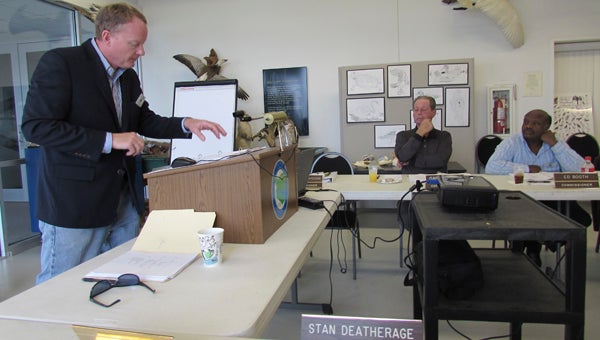FISCAL FITNESS: School of Government professor likes county’s budget, financial policies
Published 8:33 pm Saturday, February 22, 2014

MIKE VOSS | DAILY NEWS
FINANCIAL PICTURE: William Rivenbark (left), a professor at the University of North Carolina’s School of Government, told the Beaufort County Board of Commissioners during its retreat last week that the county’s overall fiscal health is excellent.
Beaufort County’s fiscal health is in excellent condition, but with some minor concerns, according to a professor at the University of North Carolina’s School of Government.
William Rivenbark, the professor, told the Beaufort County Board of Commissioners, during the Friday session of its two-day retreat last week, the county’s overall financial picture is a good one, particularly when it comes to the county’s general fund (day-to-day operations) and its fund balance (rainy-day fund).
“You have been doing a very good job of monitoring your fund balance as a percentage of your general fund,” Rivenbark said.
Rivenbark noted the county in recent years has borrowed less money from its fund balance than in previous years. “It looks like you … did rely on some of your fund balance between (fiscal years) 2008, 2009, 2010. It looks like you pulled on that fund balance a little bit, and now you’re going back up,” he said.
Although the county has a $21 million fund balance, that doesn’t mean the county can use all of it in any way it sees fit. State law places restrictions on how some of the fund balance may be spent. The county restricts use of some of the fund balance. With the available fund balance at nearly 33 percent of general-fund expenditures, the county more than meets the Local Government Commission’s recommendation that a local government have an amount equal to at least 8 percent of its general fund in its fund balance, or “rainy day” fund to cover unexpected expenditures. That 8 percent equates to a month’s revenues for a local government.
The county’s policy is to have a fund balance that’s 34 percent of its general fund, according to Jim Chrisman, the county’s assistance county manager and chief financial officer. The county sets a higher standard so it is in a better position to pay for expenses related to natural disasters such as hurricanes, he said.
With the county’s fund balance at nearly 33 percent of its general fund, the county has almost four months’ worth of cash in reserve.
The county is doing a good job of keeping its expenses related to paying off debt at a low level, Rivenbark said. For the 2013 fiscal year, nine cents of each dollar spent by the county went to pay off debt, he said. Statewide, counties spend an average of 15 cents on debt service for each dollar they spend, Rivenbark noted.
For every $1 in short-term liabilities Beaufort County has, there are $9 “in the bank,” Rivenbark told the commissioners.
“Good news: you’re covering your bills, you have cash in the bank and your debt service is relatively low compared to other counties in this state,” he said.
Rivenbark said that if the county were to sell its assets and use the revenue generated by selling it assets to pay its debts, the county would have money left over. That’s a good position for the county to be in, he said.
Rivenbark said the county would be better served if it could combine all of its water districts into one district and charge one rate for water. Currently, the county has multiple water district, with rates varying from district to district. County officials told Rivenbark that legalities, for now, would prohibit combining the districts into one district.
For additional coverage of the board’s retreat, see future editions of the Washington Daily News.
SIDEBAR
Richardson, Deatherage
skip board’s two-day retreat
Commissioners Hood Richardson and Stan Deatherage were no-shows at the Beaufort County Board of Commissioners’ two-day retreat last week at the North Carolina Estuarium.
The board met Thursday and Friday in what has become an annual event during which the board, county staff and others discuss issues facing the county. The board also receives input from school officials, consultants and county employees regarding financial matters, planning issues and capital projects (large construction projects and major equipment purchases).
Richardson’s absence can be traced to last year’s board retreat, when he walked out of it after the board voted to locate a new jail in the Beaufort County Industrial Park. Since that vote, the site for the proposed jail has been changed to the Chocowinity Industrial Park.
“Last year was the first year I had been in several years. The reason is they pull up things — this is supposed to be a casual affair that people can speak truly about so that the business of the county can be ironed out. But last year the Gang of Four — it was not an agenda item — suddenly decided they wanted to build (a new) jail. So, I’m not going to participate where people act in dishonorable ways,” Richardson said Friday.
Several months after the board’s 2013 retreat, Richardson was successful in getting the board to task County Manager Randell Woodruff and County Attorney Billy Mayo with determining if the board followed its rules of procedures when it voted to locate the proposed new jail at the Beaufort County Industrial Park. They determined the board followed its rules, but Richardson disagreed.
When asked why he did not attend the retreat’s two sessions, Deatherage suggested visiting Beaufort County Now, a website he owns and manages, and reading a posting explaining his absence from the retreat.
Commissioner Al Klemm missed the retreat’s Thursday session but attended Friday’s session. Commissioner Robert Belcher attended Thursday’s session but missed Friday’s session.





